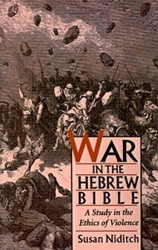empty
|
Shopping Cart
War in the Hebrew Bible
ISBN: 0195098404
EAN: 9780195098402
Version: Hebrew
(PUBOxford University)"Forces biblical scholarship to look more seriously at the difficult ethical issues raised. For anyone interested in how biblical images can be mined in constructing a modern approach to violence and warfare: essential reading,"---Journal of Religion. 180 pages, softcover.
Texts about war pervade the Hebrew Bible, raising challenging questions in religious and political ethics. Among the most disquieting war passages are those in which God demands the total annihilation of the enemy without regard to gender, age, or military status. The ideology of the "ban", however, is only one among a range of attitudes towards war preserved in the ancient Israelite literary tradition. Applying insights from anthropology, comparative literature, and feminist studies, Niditch considers a wide spectrum of war ideologies in the Hebrew Bible, seeking in each case to discover why and how these views might have made sense to biblical writers, who themselves can be seen to wrestle with the ethics of violence.
Niditch thus challenges the stereotype of the violent "Old" Testament - of law versus gospel, justice versus mercy, and judgment versus love. To understand attitudes about war in the Hebrew Bible, Niditch argues, is to understand war in general: the motivations, justifications, and rationalizations of those who wage it. In addition, this exploration reveals much about the social and cultural history of Israel, as war texts are found to map the world views of biblical writers from various periods and settings. Reviewing ways in which modern scholars have interpreted this controversial material, Niditch sheds further light on the normative assumptions that shape our understanding of ancient Israel. More widely, this work explores how human beings attempt to justify killing and violence.
Niditch's unique study will be of particular interest to students of Judaism, the Bible, and religion, as well as ethicists and historians concerned with relating classical sources tocontemporary issues.



